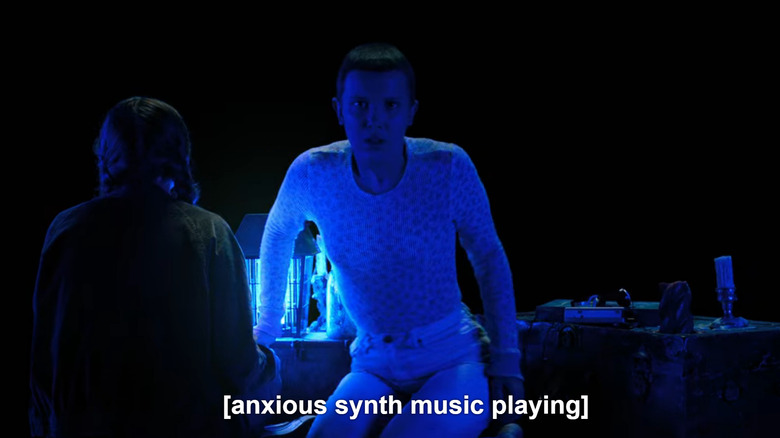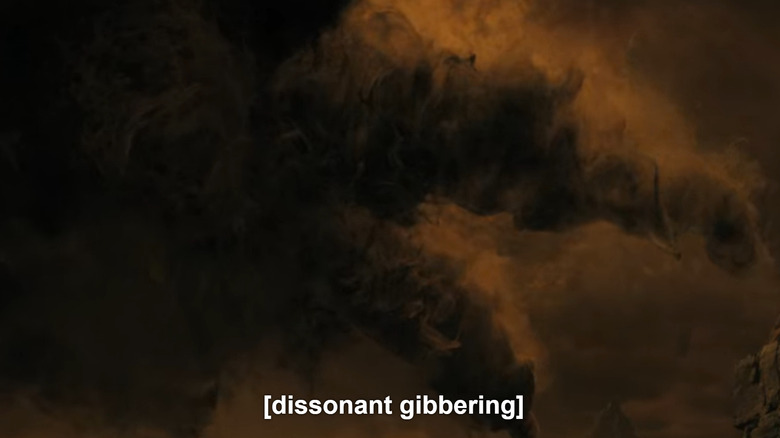How ASMR Inspired Stranger Things 4's Evocative Subtitles
Season 4 of "Stranger Things" certainly understands a thing or two about mental manipulation. Vecna (Jamie Campbell Bower) can adroitly influence his victims by peering into their minds and exposing dark feelings and repressed thoughts. His nightmarish mansion within the Upside Down is decorated in all sorts of horrors, from semi-sentient tentacles that search for trespassers to faceless, bat-like creatures with a taste for blood.
ASMR, or autonomous sensory meridian response, is a tingling or sensation of warmth that some individuals report feeling when exposed to certain stimuli like whispers or specific words and has become quite popular on Twitch streams and video games (via Very Well Mind). Noted ASMR enthusiast Dr. Craig Richard told Newsweek that not everybody experiences ASMR, adding, "People who enjoy ASMR may have differences in their oxytocin-related genes, resulting in a stronger response to ASMR triggers." Knowing this, and understanding that ASMR is typically associated with feelings of warmth, one might wonder how ASMR affected the colorful closed captioning of Season 4 of "Stranger Things."
Stranger Things Season 4's subtitle author was influenced by ASMR streams
Fans who watched Season 4 of "Stranger Things" with subtitles may have noticed that many of them provide a level of detail not typically offered up. Descriptions of footsteps squelching, Eleven (Millie Bobby Brown) panting, tentacles undulating moistly, and epic music are found throughout Season 4. So how exactly did ASMR affect the subtitles of the well-loved show?
Vulture asked subtitle author Jeff T. and QA editor Karli Witkowska about their work on the closed captioning for "Stranger Things." Jeff replied that some of his phrasings were a bit of Internet trolling, but he came to many selections of words by listening to ASMR. He joked that the word "moistly" comes up quite often, explaining, "In the past year or two, I've been watching ASMR streams to figure out which words elicit that kind of response in people, so I'll grab them and put them in my word bank."
Remember that subtitles are created for the deaf and hard of hearing
QA editor Karli Witkowska noted that many of her friends aren't a fan of the word "moist," adding, "It is supposed to be an uncomfortable situation, and that's why it was used in the show. What I've noticed quite a lot online are people who don't really understand the subtitles are for the deaf and hard-of-hearing. I've seen a lot of, 'Why are the subtitles so overly descriptive? We don't need these.' And I know you don't, but you weren't the main audience for subtitles from the start."
Oddly enough, although closed captioning was originally developed for the deaf and hard of hearing, many people of the younger generation are turning on subtitles. According to the BBC, four out of five viewers age 18–25 are watching television shows with subtitles, while less than 25% of viewers age 56 to 75 are likely to do so.
Although this could be due to sound mixing and levels, it could also explain the general fan response to the subtitles for Season 4 of "Stranger Things," which has led to several memes involving the excessive descriptions. Whether or not ASMR has anything to do with such a response is up for speculation, but at least fans now know some of what went into those verbose and interesting subtitles.


